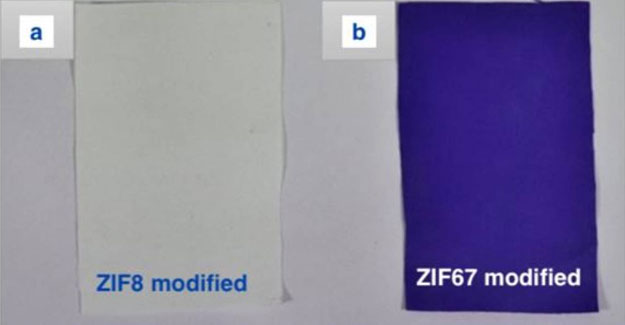
IIT Delhi Researchers Develop Modified Cotton Fabric Which Adsorbs Air Pollutants
Researchers at the Indian Institute of Technology (IIT) Delhi have developed a modified cotton fabric capable of adsorbing harmful air pollutants. ZIF-8@CM Cotton and ZIF-67@CM Cotton, as they are called, are Zeolite Imidazolate Framework (ZIF)-modified functionalised fabrics which adsorb high levels of organic air pollutants like benzene, aniline, and styrene from the ambient air. "In this study, we have shown the functionalisation of cotton fabric by ZIF MOFs (ZIF-8 and ZIF-67) using a rapid, facile, eco-friendly, and scalable approach. The ZIF functionalised textiles possess a huge potential for applications as protective garments and in controlling indoor air pollution. These fabrics may be used as upholstery for controlling gaseous pollutants that cannot be filtered out using a filter media. In particular, these can be used within closed spaces such as homes, offices, theatres, aeroplanes and other transport vehicles," said Ashwini Agrawal of the Textile and Fibre Engineering Department, IIT Delhi. The ZIF-8 functionalised fabric was found to adsorb a maximum of 19.89 mg/g of aniline, 24.88 mg/g of benzene, and 11.16 mg/g of styrene on the weight of the fabric. These fabrics could be easily regenerated by heating the fabrics at 120 degrees Celsius and reused without any decrease in their adsorption capacity for several cycles, the team said. Using a technique known as in-situ growth of ZIF-8 and ZIF-67 nanocrystals on the carboxymethylated cotton fabric using a rapid water-based textile finishing approach, the researchers at IIT Delhi have successfully developed a low-cost cotton fabric capable of adsorbing 400-600 per cent more VOCs than ordinary cotton fabrics. Further, these fabrics are robust and can withstand even the harsh conditions of washing. They can be used repeatedly and in designing functional filters and pollution controlling upholstery fabrics among others. IIT Delhi research scholar Hardeep Singh, who carried out detailed experiments to develop these fabrics, said the porous materials such as activated carbon, zeolites, and Metal Organic Frameworks (MOFs) are capable of adsorbing VOCs from air. "The MOFs can be tweaked to create textiles that have antimicrobial, biomedical, particulate matter filtering, fuel filtering, chemical warfare protecting and UV radiation absorbing properties. The ZIFs specifically are more suitable under Indian conditions," he said.
Textile Excellence
If you wish to Subscribe to Textile Excellence Print Edition, kindly fill in the below form and we shall get back to you with details.













